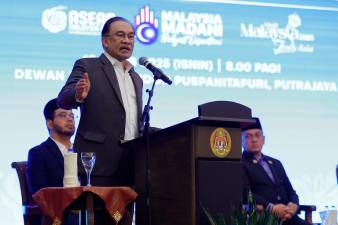KUALA LUMPUR: Digital transformation and artificial intelligence (AI) programmes could cost Malaysia tens of billions of ringgit over the next five years, Prime Minister Anwar Ibrahim warned today, cautioning civil servants against repeating past mistakes where huge budgets failed to deliver results.
He tasked the Chief Secretary to the Government (KSN) and the ministries of Digital and Communications to examine critical issues such as the gap between expectations and reality, data governance, and the impact of AI on Standard Operating Procedures. Initial solutions, he said, must be presented within weeks.
“I’m asking KSN and all departments to reflect on this matter for, say, two weeks to one month, and provide an initial answer to address this problem.
“Do not repeat the problems that have occurred or been experienced by many other large legacy companies,” he said at the monthly civil service assembly.
Anwar also cautioned against using AI as a cover for inefficiency or corruption.
“The principle (when it comes to AI) is transparency and effectiveness. There’s no use spending billions but having nothing to show for it,” he stressed.
The Prime Minister raised what he called the “AI productivity paradox,” warning that despite widespread hype and heavy investment, the promised gains from AI tools often fail to materialise.
“While digital transformation is a cornerstone of national change, moving to digital sectors, IT and AI does not automatically guarantee increased productivity,” he said, citing studies by the United Nations University Tokyo and McKinsey.
“These studies show that although AI tools – including chatbots – can save users 64% to 90% of time, only 3% to 7% of these gains actually improve earnings or productivity,” he added.
He said this was at the heart of the “AI productivity paradox” and pointed to JP Morgan, a major US bank, which limits employee use of ChatGPT during working hours to specific departments due to unproven productivity benefits.
Anwar drew historical parallels, recalling the “paperless office” concept of the 1980s that ended up increasing paper use instead of reducing it. He also cited management expert Peter Drucker’s observations on privatisation, where the belief that private companies were always more efficient proved wrong in cases lacking transparency and proper tender processes.
“Good governance remains the fundamental principle – the golden rule – for achieving efficiency, not simply adopting new technologies or systems,” he said.
He stressed the Islamic principle of “tabayyun” (verification) and cautioned against relying on AI tools like ChatGPT for sensitive information such as Quranic verses, noting a recent case in London where a prominent Islamic organisation used ChatGPT for such purposes, resulting in incomplete or inaccurate citations.
“AI is not absolute,” he said. “It requires human verification, especially for critical information or during times of public anxiety,“ he added.
